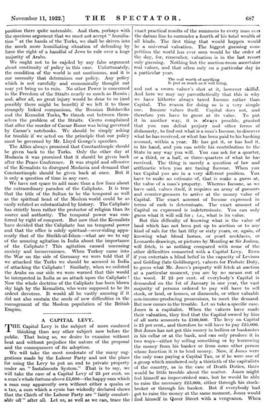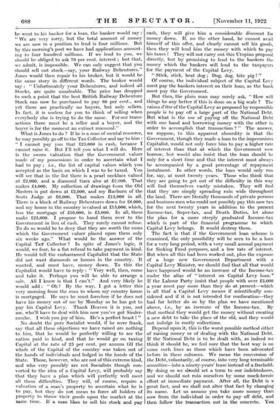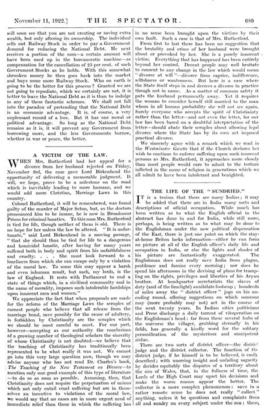A CAPITAL LEVY.
THE Capital Levy is the subject of more confused thinking than any other subject now before the public. That being so, we desire to examine without heat and without prejudice the nature of the proposal and the consequences of its adoption.
We will take the most moderate of the many sug- gestions made by the Labour Party and not the plans for using the Levy to put an end to private property under an " Instalments System." That is to say, we will take the case of a Capital Levy of 25 per cent. on a man's whole fortune above £5,000—the happy sum which a man may apparently own without either a qualm or a tax, a sum which a cynic has wickedly declared shows that the Chiefs of the Labour Party are " fairly comfort- , ably off " after all. Let us, as well as we can, trace the exact practical results of the summons to every man over the datum line to surrender a fourth of his total wealth of all kinds. The first thing that would happen would be a universal valuation. The biggest guessing com- petition the world has ever seen would be the order of the day, for, remember, valuation is in the last resort only guessing. Nothing but the auction-room ascertains real values, and that often only on a particular day in a particular year.
The real worth of anything Is just as much as it will bring,
and not a sworn valuer's shot at it, however skilful. And here we may say parenthetically that this is why we have hitherto always taxed Income rather than Capital. The reason for doing so is a very simple one. Income values itself. Capital does not, and therefore you have to guess at its value. To put it in another way, it is always possible, granted that you can defeat perjury and other forms of dishonesty, to find out what is a man's Income, to discover what he has received, or what has been.paid to his banking account, within a year. He has got it, or has had it, in his hand, and you can settle his contribution to the State in any way you will. You can ask for a quarter, or a third, or a half, or three- quarters of what he has received. The thing is merely a question of law and arithmetic when you arc taxing Income. When you tax Capital you are in a very different position. You have to make an estimate of, that is make a guess at, the value of a man's property. Whereas Income, as we have said, values itself, it requires an army of guessers and counter-guessers to arrive at the money value of Capital. The exact amount of Income expressed in terms of cash is determinate. The exact amount of Capital so expressed is indeterminate. You can only guess what it will sell for ; i.e., what is its value.
But this difficulty of knowing what is the value of land which has not been put up to auction or to any kind of sale for the last fifty or sixty years, or, again, of knowing what blood horses, or pearl necklaces, or Leonardo drawings, or pictures by Memling or Sir Joshua, will fetch, is as nothing compared with some of the other difficulties connected with a Capital Levy. Even if you entertain a blind belief in the capacity of Levison and Golding (late Goldburger), valuers for Probate Duty, to guess what Mr. Jones's property will fetch at auction at a particular moment, you are by no means out of the wood. If 25 per cent. of everybody's Capital is demanded on the 1st of January in one year, the vast majority of persons ordered to pay will have to sell stock, or land, or houses, or diamonds, or other valuable non-income-producing possessions, to meet the demand, But now comes in the trouble. Let us take a specific case. Jones is a capitalist. When the valuers have made their valuation, they find that the Capital owned by him of all sorts amounts to £100,000. The levy on Capital is 25 per cent., and therefore he will have to pay £25,000. But Jones has not got this money in bullion or banknotes in his cellar or at the bank, and can only produce it in two ways—either by selling something or by borrowing the money from his banker or from some other person whose function it is to lend money. Now, if Jones were the only man paying a Capital Tax, or if he were one of a group which numbered only a thirtieth of the capitalists of the country, as in the case of Death Duties, there would be little trouble about the matter. Jones might feel himself an impoverished man, but he would be able to raise the necessary £25,000, either through his stock- broker or through his banker. But if everybody had got to raise the money at the same moment, Jones would find himself in Queer Street with a vengeance. When he went to his banker for a loan, the banker would say : " We are very sorry, but the total amount of money we are now in a position to lend is four millions. But by this morning's post we have had applications amount- ing to four hundred millions. If we lend to you, we should be obliged to ask 70 per cent. interest ; but that, we admit, is impossible. We can only suggest that you -should sell out stock—say, your Railway Debentures." Jones would then repair to his broker, but it would be the same story in different words. The broker would say : " Unfortunately your Debentures, and indeed all Stocks, are quite unsaleable. The price has dropped to such a point that the best British Railway Debenture Stock can now be purchased to pay 80 per cent., and yet there are practically no buyers, but only sellers. In fact, it is useless for you to think of selling when everybody else is trying to do the same. For our trans- actions there must be a seller and a buyer, and the buyer is for the moment an extinct mammal."
What is Jones to do ? If he is a man of mental resource, he may possibly go off to the Tax Collector and say to him : " I cannot pay you that £25,000 in cash, because I cannot raise it. But I'll tell you what I will do. Here is the sworn valuation that the Government valuer made of my possessions in order to ascertain what I had to pay ; i.e., the list of capital values which you accepted as the basis on which I was to be taxed. You will see that in the list there is a pearl necklace valued at £2,000, and a diamond tiara also at £2,000. That makes £4,000. My collection of drawings from the Old Masters is put down at £2,000, and my Raeburn of the Scots Judge at £6,000. That makes £12,000 in all. There is a block of Railway Debentures down for £8,000, and my house in the country is valued at £15,000, which, less the mortgage of £10,000, is £5,000. In all, these make £25,000. I propose to hand them over to the Government in lieu of cash. They surely cannot refuse. To do so would be to deny that they are worth the sums which the Government valuer placed upon them only six weeks ago." What would be the answer of the Capital Tat Collector ? In spite of Jones's logic, it would, we fear, be a flat refusal to take payment in kind. He would tell the embarrassed Capitalist that the State did not want diamonds or houses in the country. It wanted, and must have, money down. To this the Capitalist would have to reply : " Very well, then, come and take it. Perhaps you will be able to arrange a sale. All I know is that I can't." And very likely he would add : " Oh ! By the way, I got a letter this very morning from the man to whom my country house is mortgaged. He says he must foreclose if he does not have his money out of me by Monday as he has got to pay his Capital Levy. Thank Heaven it is you, not me, who'll have to deal with him now you've got Sinder- combe. I wish you joy of him. He's a perfect beast ! "
No doubt the pure Socialist would, if he were frank, say that all these objections we have raised are nothing to him, that he would be perfectly willing to see the nation paid in kind, and that he would go on taxing Capital at the rate of 25 per cent. per annum till the whole of the Capital of the country was taken out of the hands of individuals and lodged in the hands of the State. Those, however, who are not of this extreme kind, and who very possibly are not Socialists though con- verted to the idea of a Capital Levy, will probably say that they have a plan which will perfectly well meet all these difficulties. They will, of course, require a valuation of a man's property to ascertain what he is to pay, but they do not mean to force all holders of property to throw their goods upon the market at the same time. If a man likes to sell his stock and pay cash, they will give him a considerable discount for money down. If, on the other hand, he cannot avail himself of this offer, and clearly cannot sell his goods, then they will lend him the money with which to pay his taxes ! They will not carry out this Utopian proposal directly, but by promising to lend to the bankers the money which the bankers will lend to the taxpayers for the payment of the Capital Levy.
" Stick, stick, beat dog ; Dog, dog, bite pig ! "
Of course, the individual subject of the Capital Levy must pay the bankers interest.on their loan, as the bank must pay the Government.
But then, the plain man may surely ask, " How will things be any better if this is done on a big scale ? The raison d'être of the Capital Levy as proposed by responsible people is to pay off a large.part of the National Debt. But what is the use of paying off the National Debt with one hand and borrowing money with the other in order to accomplish that transaction ? " The answer, we suppose, to this apparent absurdity is that the Government, though they made a loan to the impecunious Capitalist, would not only force him to pay a higher rate of interest than that at which the Government now borrow, but would also insist that the loan should be only for a short time and that the interest must always be accompanied by a good percentage of repayment instalment. In other words, the loan would only run for, say, at most twenty years. Those who think that they are going to get out of the difficulty in this way will find themselves vastly mistaken. They will find that they are simply spreading ruin wide throughout the land. There are literally thousands of private persons and business men who could not possibly pay this new tax for the next twenty years in addition to the present Income-tax, Super-tax, and Death Duties, let alone the plan for a more steeply graduated Income-tax which is part of the financial programme to which Capital Levy belongs. It would destroy them.
The fact is that if the Government loan scheme is examined, the only possibility will be seen to be a loan for a very long period, with a very small annual payment for Sinking Fund purposes, and a low rate of interest. But when all this had been worked out, plus the expense of a huge new Government Department with a Capital Levy Minister, we should find that all that would have happened would be an increase of the Income-tax under the alias of " interest on Capital Levy loan.' If the Labour Party insist that people with over £5,000 a year must pay more than they do at present—which is all time a Capital Levy means if scientifically con- sidered and if it is not intended for confiscation—they had far better do so by the plan we have mentioned above, i.e., by an increase of the Income-tax. By that method they would get the money without creating a new debt to take the place of the old, and they would not indulge in costly collections.
Depend upon it, this is the worst possible method either of raising money or of dealing with the National Debt. If the National Debt is to be dealt with, as indeed we think it should be, we feel sure that the best way is on some such lines as those which have been advocated before in these columns. We mean the conversion of the Debt, voluntarily, of course, into very long terminable annuities—into a ninety-years' lease instead of a freehold. By doing so we should set a term to our indebtedness, and we should not ruin ourselves by some mock-heroic effort at immediate payment. After all, the Debt is a great fact, and we shall not alter that fact by changing its name. Let us assume you take more money than now from the individual in order to pay off debt, and then follow the transaction out in the concrete. You will soon see that you are not creating or saving extra wealth, but only altering its ownership. The individual sells out Railway Stock in order to pay a Government demand for reducing the National Debt. He next receives a portion of the sum—a certain amount will have been used up in the bureaucratic machine—as compensation for the cancellation of 25 per cent. of such Government Stocks as he holds. With this somewhat shrunken money he then goes back into the market and buys some more Railway Stock. Who on earth is going to be the better for this process ? Granted we are not going to repudiate, which we certainly are not, it is better to leave the National Debt as it is than to indulge in any of these fantastic schemes. We shall not fall into the paradox of pretending that the National Debt is an economic advantage. It is, of course, a very unpleasant record of a loss. But it has one moral or political advantage. So long as the National Debt remains as it is, it will prevent any Government from borrowing more, and the less Governments borrow, whether in war or peace, the better.




























































 Previous page
Previous page